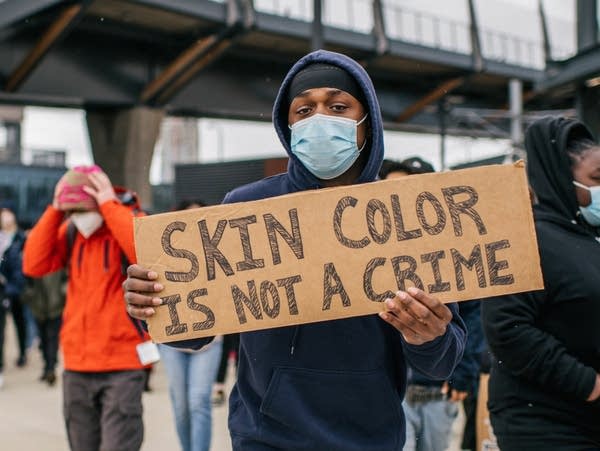One year after Floyd’s killing, what hasn't changed?

Go Deeper.
Create an account or log in to save stories.
Like this?
Thanks for liking this story! We have added it to a list of your favorite stories.
In the weeks following the murder of George Floyd, protesters filled the streets demanding change. Corporations and government officials promised diversity and equity. The pandemic lockdowns put lives on pause, forcing the world’s attention to the ugly sight of police violence and racial injustice.
A sense of urgency embroiled the country.
But many Black Minnesotans say the year has gone by without the kind of transformation that would meaningfully improve the lives of African Americans and other people of color.
“I have not had conversations with my two adult Black sons to tell them it's safe to go in the water, because it's not,” said Steven Belton, president and chief executive of the Urban League Twin Cities. “The reality is, I’m just bracing for the next George Floyd, for the next Daunte Wright, because not enough has changed or happened quickly enough that I can assure that that’s not going to happen.”
Turn Up Your Support
MPR News helps you turn down the noise and build shared understanding. Turn up your support for this public resource and keep trusted journalism accessible to all.

Police reform in Minneapolis needs to go much further to protect Black lives, said Belton, whose organization helps community members with housing, education and employment. Yet he also believes policing is far from the only system that has led to poor outcomes for Black people.
“I wish that it was just policing — because then we can focus all of our energy on that,” he said.
Minnesota still experiences some of the worst racial disparities in unemployment, graduation rates and homeownership.
Those inequities might take decades and a lot of work to eradicate — and that can be hard for people to hear.
Law professor Artika Tyner, founding director of the Center on Race, Leadership and Social Justice at the University of St. Thomas, remembers hearing protests outside of her window every day following Floyd’s killing.
‘More than a commitment’
And their chants still resonate: People want justice now, Tyner said. She referenced a 2016 study that found it would take 228 years for Black families to match the household wealth of white Americans. “People don't have time to hear those messages,” she said.
But Tyner adds that change-makers are trying to undo four centuries of racism. She says it's going to take more than a commitment to close disparity gaps.
“It'll take more than a commitment — it's going to take action. It's going to take more than action — it'll take accountability. If we come into every issue with that awareness, maybe, maybe we'll get some progress,” she said. “We're not being intentional enough to achieve some real meaningful goals.”
Police reform debate is one example that shows how difficult it’s been for lawmakers to reach a consensus.
And those opinions are reflective of society as a whole. A new NPR/PBS NewsHour/Marist poll shows that white and Black Americans have different experiences with discrimination and police.
While three-fourths of Americans agreed with the guilty verdicts for former Minneapolis police officer Derek Chauvin, the poll shows that about half of Republicans and Trump supporters think it was either the wrong decision or they're not sure.
It's opinions like these that make Belton, of the Urban League, frustrated.
“Frustrated because I don't think enough people were awakened,” Belton said. “People woke up, saw the video and went back to sleep.”

Resistance to change has manifested in places like the education system. Discussions about how to teach students about race and inequality have led to opposition from parents and policymakers.
Jerome Treadwell is a high school student and an activist with the St. Paul NAACP. Treadwell and other organizers have been calling out racist incidents in schools, such as social media posts that make fun of Floyd’s death, in hopes of holding students accountable for their behavior.
Treadwell says that while progress has been made in terms of awareness and changes in curriculum, it hasn't been comprehensive enough.
“We're not only in a coronavirus pandemic, but we're in the racial pandemic, where oftentimes youth are deprived from their own history and their culture.”
The past year has demonstrated the need to have difficult conversations about race. But changes that lead to racial equity can take a lifetime.


